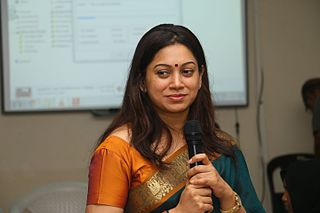Related Research Articles

Sean Leland Sebastian Gullette is an American film director, writer, screenwriter, actor, and producer.
Alice Wu is an American film director and screenwriter.
Leah Meyerhoff is a Student Academy Award-nominated director, producer and screenwriter. She has received attention as the writer and director of the feature film I Believe in Unicorns starring Natalia Dyer and Peter Vack. Her films have screened in over 200 film festivals worldwide and won over a dozen international awards.
The celluloid ceiling is a metaphor for the underrepresentation of women in hiring and employment in Hollywood. The term is a play on the metaphor of the "glass ceiling," which describes an invisible barrier that keeps a given demographic from rising beyond a certain level in a hierarchy. Celluloid refers to the material used to make the film stock that was once used to make motion pictures. The term is usually applied to behind the screen workers only.

Ava Marie DuVernay is an American filmmaker. She won the directing award in the U.S. dramatic competition at the 2012 Sundance Film Festival for her second feature film Middle of Nowhere, becoming the first black woman to win the award. For her work on Selma (2014), DuVernay became the first black woman to be nominated for a Golden Globe Award for Best Director, and also the first black female director to have her film nominated for the Academy Award for Best Picture. In 2017, she was nominated for the Academy Award for Best Documentary Feature for her film 13th (2016).

Anjali Menon is an Indian film director and screenwriter who predominantly works in the Malayalam film industry. She made her directorial debut with the film Manjadikuru. She won the National Film Award for Best Screenplay (Dialogues) for Ustad Hotel at the 60th National Film Awards. She was one of the founding members of the Women in Cinema Collective (WCC), an organization that focuses on gender equality in the Malayalam film industry.

Céline Sciamma is a French screenwriter and film director. A common theme in Sciamma's films is the fluidity of gender and sexual identity among girls and women.
Lindsey Dryden is an Emmy award-winning British film director, producer and writer.

Tom Donahue is an American film director and producer. His latest documentaries include This Changes Everything, which he directed and produced, about systemic gender bias and discrimination against women in Hollywood and entertainment, and HBO's Bleed Out, which he produced with Ilan Arboleda under the banner of their independent production studio, CreativeChaos vmg. The Los Angeles Press Club awarded Bleed Out with the film Best Documentary and runner-up for Best Medical/Health Reporting at its annual National Arts and Entertainment Journalism Awards and SoCal Journalism Awards in July 2019. Both films premiered in the fall of 2018. Donahue has also received much critical acclaim for directing HBO's Casting By, which was nominated for an Emmy, and Thank You for Your Service, which was released theatrically by Gathr Films in 2016. In 2010, Donahue founded the production company CreativeChaos vmg with Ilan Arboleda and Steve Edwards.

Hinaleimoana Kwai Kong Wong-Kalu, also known as Kumu Hina, is a Native Hawaiian māhū – a traditional third gender person who occupies "a place in the middle" between male and female – as well as a modern transgender woman. She is known for her work as a kumu hula, as a filmmaker, and as a community leader in the field of Kanaka Maoli language and cultural preservation. She teaches Kanaka Maoli philosophy and traditions and promotes cross-cultural alliances throughout the Pacific Islands. Described as a "powerful performer with a clear, strong voice", she has been hailed as "a cultural icon".
Jen McGowan is an American filmmaker. At the 2014 South by Southwest Film Festival, McGowan won the Gamechanger Award for Kelly & Cal, her first feature film. McGowan is the creator of filmpowered.com, an international skill-sharing, networking and job resource for professional women in film and television. She is an honorary member of the Alliance of Women Directors.

Inequality in Hollywood refers to the various forms of discrimination and social inequality in the American media industry. There are many branches of the media industry, such as news, television, film, music, agencies, studios, to name some of the major players. In each one of these branches, there are many instances of inequality since Hollywood formed as the entertainment hub of America in the early 1900s.

Women are involved in the film industry in all roles, including as film directors, actresses, cinematographers, film producers, film critics, and other film industry professions, though women have been underrepresented in creative positions.
Menelik Shabazz is a Barbados-born film director, producer, educator and writer, acknowledged as a pioneer in the development of independent Black British cinema, having been at the forefront of contemporary British filmmaking for more than 30 years. Shabazz is best known for the 1981 film Burning an Illusion, his first feature. He was also co-founder in the 1980s of Kuumba film production company and Ceddo Film and Video Workshop, as well as being "founding father of the BFM media project" as the publisher of Black Filmmakers Magazine and creator of BFM International Film Festival.
CODE: Debugging the Gender Gap is a 2015 documentary by Robin Hauser Reynolds. It focuses on the lack of women and minorities in the field of software engineering. It premiered on April 19, 2015 at the Tribeca Film Festival in New York. The film focuses on inspiring young girls to pursue careers in computer science by profiling successful women in computer programming, such as, Danielle Feinberg of Pixar, Aliya Rahman of Code for Progress, and Julie Ann Horvath of &Yet. By profiling and displaying the careers of these women, the film makers hope to show that computer science can be creative, lucrative, and rewarding.
ShanghaiPRIDE Film Festival (ShPFF), is an annual LGBT film festival held in Shanghai, China. It was first established in 2015.
Nikyatu Jusu is a Sierra Leonean-American independent filmmaker and Assistant Professor in Film & Video at George Mason University. Jusu focuses her films on the complexities of Black female characters. Her work deals with displaced, immigrant women in the United States. She is best known for her short film Suicide By Sunlight, which premiered at 2019 Sundance Film Festival.
Briony Kidd is an Australian director based in Hobart, Tasmania. She has a Bachelor of Film and TV from the Victorian College of the Arts, Melbourne.
Fowzia Fathima is an Indian film cinematographer and director. Fowzia is known for her cinematography on feature films such as Mitr, My Friend 2012, Gulumaal: The Escape 2009 and Uyir 2006. She is an intuitive practitioner of Cinematography across media technologies, a hands-on Academic with an eye trained in history of art practices along with a wide range of experience in Film Production and Teaching in contemporary cinema based in India.
Sarita Khurana is a film director, producer, and educator based in Brooklyn, NY. Khurana's films explore South Asian stories from female perspectives. Migration, memory, culture, gender, and sexuality are common themes throughout her work. Khurana was the first Desi woman to win the Albert Maysles New Documentary Director Award at Tribeca Film Festival with her collaborator, Smriti Mundhra.
References
- ↑ "Film Fatales". Film Fatales. Retrieved 1 June 2019.
- ↑ "These Women Changed Their Perspectives to Become Woke". O Magazine. June 1, 2019.
- ↑ "The Film Fatales Collective Trains a Lens on Gender Inequality". NY Times. August 21, 2015.
- ↑ "an interview with film fatales founder leah meyerhoff". the Wild Magazine. Retrieved 16 March 2015.
- ↑ "Film Fatales to support 10 premieres during the Tribeca Film Festival". Film Industry Network. April 17, 2018.
- ↑ Bernstein, Paula. "Attention, Female Filmmakers: The Film Fatales Are Here to Help You". Indiewire. Retrieved 16 March 2015.